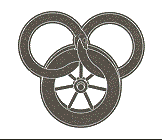[ Introduction | Contents | Administrivia | Information | World | Trivia | Prophecies | Publishing | Credits ]

[Will Baird notes:Shai...is the Muslim name for Satan literally.]
"Recently, a friend of mine had to read the _Iliad_. (Homer's story of the Trojan War) In Book 21, a character named Agenor attacks Hektor, and is defeated. Not much is said about him (Agenor) other than that he is "blameless and powerful", and knew that Hektor was stronger than he was. He attacked anyway, figuring that while Hektor was much more combat-capable, Agenor had the gods on his side, not to mention the fact that even the powerful make mistakes. In a few minutes, Hektor defeats Agenor, and Apollo surrounds the loser "in a thick mist", and transports him back to Troy. Some interesting parallels between this an TEotW's final battle: Both Aginors knew that his opponent was more powerful, both were full of pride, both attacked anyway."-- Contributed by: Mike O'Malley
[ Introduction | Contents | Administrivia | Information | World | Trivia | Prophecies | Publishing | Credits ]
This page was last modified on 24-Aug-1996, 15:55. Illustrations © 1989-1996 by Tor Books.